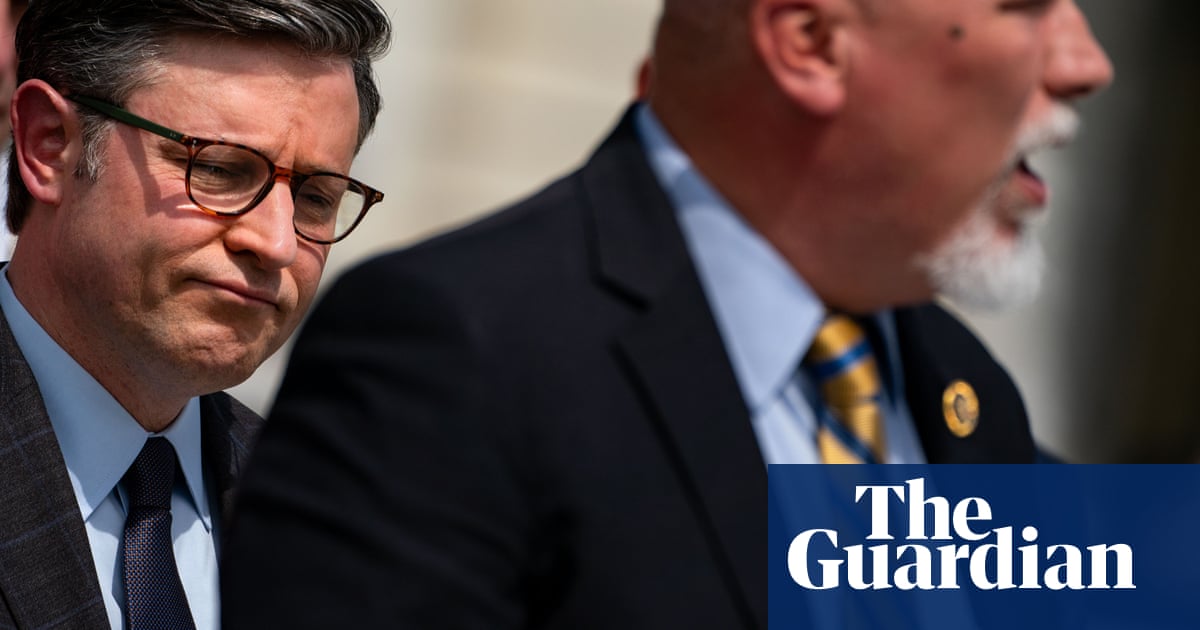Rightwing lawmakers derailedDonald Trump’s signature legislation in theHouse of Representativeson Friday, preventing its passage through a key committee and throwing into question whetherRepublicanscan coalesce around the massive bill.
The party has spent weeks negotiating a measure dubbed the “one big, beautiful bill” that would extend tax cuts enacted during Trump’s first term, fund mass deportations of undocumented immigrants, and temporarily make good on his campaign promise to end the taxation of tips and overtime. To offset its costs, Republicans have proposedcuts to the federal safety net, including Medicaid and the Supplemental Nutrition Assistance Program.
At a House budget committee hearing today intended to advance the measure one step closer to a floor vote, four Republican members of the far-right Freedom Caucus joined with the Democratic minority to block it from proceeding, arguing the legislation does not make deep enough cuts to federal spending and to programs they dislike.
“This bill falls profoundly short. It does not do what we say it does, with respect to deficits,” said Chip Roy, a Texas representative who opposed the bill alongside fellow Freedom Caucus members Andrew Clyde of Georgia, Josh Brecheen of Oklahoma and Ralph Norman of South Carolina. Pennsylvania’s Lloyd Smucker initially voted to advance the bill, then changed his vote to no at the last minute, which he said was a procedural maneuver to allow the bill to be reconsidered in the future.
The setback raises the stakes for the House speaker, Mike Johnson, who had set a goal of Memorial Day to get the legislation passed through the House and on to the Senate. Trump has said he would like to have the bill on his desk by the 4 July Independence Day holiday, and earlier on Friday attempted to pressure conservative holdouts.
“Republicans MUST UNITE behind, ‘THE ONE, BIG BEAUTIFUL BILL!’” the president wrote on Truth Social. “We don’t need ‘GRANDSTANDERS’ in the Republican Party. STOP TALKING, AND GET IT DONE!”
Republicans are crafting the bill using the budget reconciliation procedure, which Senate Democrats cannot block with the filibuster. But the GOP is split over what to include and what to cut in the expensive legislation, which Congress’s non-partisan joint committee on taxation estimates will cost $3.7tn through 2034.
Rightwing lawmakers want to see big reductions in government spending, which has climbed in recent years as Trump and Joe Biden responded to the Covid-19 pandemic and pursued their own economic policies.
“We’re … committed to ensuring the final package is fiscally responsible, rightsizing government and putting our fiscal future back on track. Unfortunately, the current version falls short of these goals and fails to deliver the transformative change that Americans were promised,” Clyde said at the budget committee.
Sign up toHeadlines US
Get the most important US headlines and highlights emailed direct to you every morning
after newsletter promotion
He called for deeper cuts to Medicaid, but many Republicans in both the House and Senate havesignaled nervousnesswith dramatic funding reductions to the program that provides healthcare to lower-income and disabled Americans. Others in the GOP dislike parts of the bill that wouldcut green tax creditscreated by Biden’s Inflation Reduction Act.
And a small group of Republicans representing districts in blue states such as New York and New Jersey are demanding an increase in the deduction for state and local taxes, saying it will provide needed relief to their constituents. But including that would drive the cost of the bill even higher, risking the ire of fiscal conservatives.
Johnson has little choice but to listen to all of these groups. The GOP can afford to lose no more than three votes in the chamber, a historically small margin that has made passing legislation a tightrope walk.
